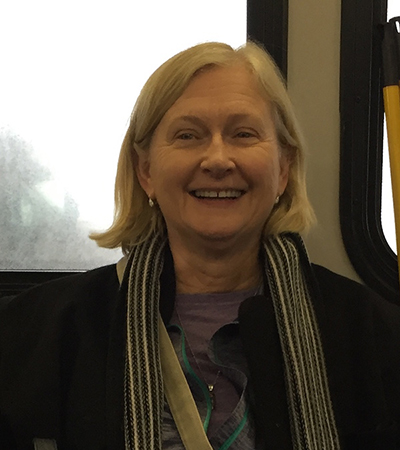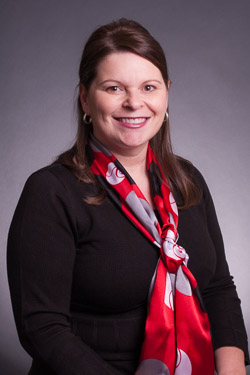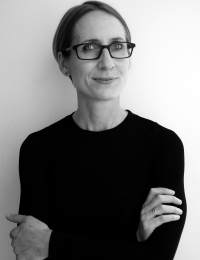Research Spotlight on Women Faculty: Martha Smithey, Amy Heuman, and Kristine Stiphany
March 27, 2020 |
During March, Texas Tech is celebrating women faculty who exemplify excellence in research, scholarship, creative activity, teaching, and mentoring.
Martha Smithey
Associate Professor; Sociology Graduate Director; Department of Sociology, Anthropology,
and Social Work

Smithey's areas of specialization include criminology, family violence, and research methods. Her current research interests are violence against children, intimate partner violence, and parenting.
What inspired you to work in your field/area of expertise?
I grew up in a small, southern town where I saw a lot of social injustice and unfairness. With time, I realized women and children were often those who experienced the brunt of the consequences. Studying violence and the home, I soon learned the profound level of connection of these social dimensions. I became motivated to understand the social forces creating the cultural and economic inequities of women and mothering that result in dire, desperate conditions under which many women and their children live.
Who inspired you to pursue academia?
I started college believing studying the law would be the most effective career path for understanding social injustice and crime. I declared pre-law as my major. However, I soon discovered sociology. My first quarter in college, I took Social Problems for my social science elective. It was taught by a dynamic, challenging woman named Rose Daigle. I took as many courses as I could with her. I realized sociology/criminology fit my interests and career goals. I have been majoring in sociology ever since. All my degrees are in sociology with criminology and the family as my major areas.
What would you tell your female students interested in pursuing an academic career?
To know you are smart, capable, and have more power than you realize. Gender socialization
sustains a culture where females are expected to defer to men, wait for men, and not
challenge them. Consequently, females are easily intimidated because they question
their own ability, even when they have better ideas and solutions. Don't let your
socialization experience define you. You have the power to stand up for yourself.
Do it.
Amy Heuman
Associate Professor; Department of Communication Studies
 Heuman's research centers on the role communication plays in cultural identity negotiations
and performances of identity, intercultural relationships, co-cultural group and dominant
group interactions, Latinx cultural contexts as well as how communication is utilized
by community members to mobilize for social justice. She is keenly interested in the
intersecting negotiations of race/ethnicity/class/gender/ and sexuality through critical
and feminist lenses.
Heuman's research centers on the role communication plays in cultural identity negotiations
and performances of identity, intercultural relationships, co-cultural group and dominant
group interactions, Latinx cultural contexts as well as how communication is utilized
by community members to mobilize for social justice. She is keenly interested in the
intersecting negotiations of race/ethnicity/class/gender/ and sexuality through critical
and feminist lenses.
What inspired you to work in your field/area of expertise?
I became interested in pursuing a degree in Communication Studies and more specifically intercultural and gender communication through my family life and lived experience. I grew up in a Midwestern working class and predominantly white family dynamic that became increasingly interculturally connected by way of interfaith, interracial, interethnic, and queer familial relationships. This experience prompted me to become more aware of the need for negotiating difference. As a result of this upbringing, I have lived most of my life interculturally and intersectionally and have been drawn to the ways that communication can be utilized to shape our senses of self, identities, and cultures.
My research centers on the role communication plays in intersecting negotiations and performances of identity (race/ethnicity/class/ability/gender/and sexuality), co-cultural group and dominant group interactions, and also how communication is utilized by marginalized community members to mobilize for social justice. I have spent significant time along the U.S.-Mexico border where I have also engaged in ethnographic and community-based research within the colonias. Along with this, I am also actively involved in research focused on the empowerment of women and girls.
Who inspired you to pursue academia?
There were a number of strong, smart, and courageous women who encouraged me to persevere as a learner. One of those was my mom, who simultaneously earned her bachelor's degree alongside my sister and I and all while battling with stage four breast cancer. To this day, she is a survivor who taught me how to be diligent, focused, and determined. Other women include several teachers and professors. Two of these women, my eighth-grade teacher and my college professor, both taught in the areas of mathematics and statistics. These were two of my weakest subjects but they each taught me to never give up, nor let someone make you feel less than, and to perform to my highest potential. In fact, I went on to take a post-baccalaureate statistics course to ensure I was as competitive for graduate studies as possible. Another professor, had such a positive and motivating communicative presence that I aspired to touch students' lives just as she did. In due course, this led me to select communication as my area of study and as a way to engage people in dialogue regarding their lives and greater social worlds and to continue onward to pursue my doctorate.
What would you tell your female students interested in pursuing an academic career?
We need you! Just like I needed the women educators in my life to serve as role models and trailblazers, you are vital to the future of higher education. We must have women—like you—shaping the discourse, policies, and practices within our institutions of higher learning. We need women and people of diverse identifications to be involved in charting our research paths and agendas within the dominant system of the academy. It takes women being involved in academics to open up doors and break down persisting walls. Pursuing a career in academe holds the opportunity for changing lives, for making ripple effects with our students in the classroom, the communities that we engage with, and within our research journals. It can be difficult to be a woman in academe but it is also amazing in those moments of realization that you have made a meaningful difference in someone's life and that they are carrying this forward on their journey. What better way to be both deliberate and instrumental in bringing about broader vantage points and opportunities for all!

Kristine Stiphany
Assistant Professor; College of Architecture

Kristine Stiphany is a registered architect and founder of the Chapa Urban Lab in São Paulo, Brazil, formed when she was a National Science Foundation SBE postdoctoral fellow at the University of Texas at Austin (www.chapa.io). Stiphany's research and practice havefocused upon the intersection of computational thinking for social equity in urban built environments, especially large Latin American cities. Stiphany's current practice includes an Accessory Dwelling Unit in Austin, Texas, and the urban design of Brownie Neighborhood Park for the City of Austin Parks and Recreation, in collaboration with the North Lamar Neighborhood Association.
What inspired you to work in your field/area of expertise?
My mother was a school teacher in a low-income rural school, in northwestern Michigan. Schools are often where the most pressing domestic issues come to the fore, if not reside. On many occasions my sister and I sat in the back of the car, and I watched my mom knock on doors, take food, stay for coffee, and otherwise engage families who lived in homes that were otherwise invisible in my idyllic world, riding my bike around our little town on the shores of Lake Michigan. These houses were inland, tucked away in the woods, at the edge of asparagus fields, often surrounded by a surface of old cars and junk. My mom would never claim to have studied housing, and she never suggested that I do so. But it was through watching her engage, on such a human level, the deep variations in where and how people live – even in a little rural town – that I became inspired to study how and where people live around the world. Here at Texas Tech, I extend this inspiration through a series of Latin American housing studios in Brazil (2018), Ecuador (2019) and Mexico (2020).
Who inspired you to pursue academia?
Two people inspired me to pursue academia: Dr. Maria Ruth Amaral de Sampaio, a sociologist and former Dean of the Faculty of Architecture and Urbanism at the University of São Paulo, and Pele da Silva, who lives in a slum. When I met Dr. Sampaio, I was a documentary photographer and traveling around Latin America, with an intention to pursue graduate studies. Dr. Sampaio invited me to photograph a vertical slum, where residents who had built a tower and were fighting to avoid eviction (they eventually won). As this story unfolded, I saw architecture differently: buildings were not just objects, but something that people construct collectively, step-by-step, often through social struggle. Through my Fulbright, I studied another instance of informal housing in a small slum called Bamburral, located next to São Paulo's largest landfill. There I met Pele and his family amid a sprawling slum, adjacent to a sewerage pit. At that time, Pele asked me what an architect does with a place like that. When I had the opportunity to design a slum upgrading project with residents in Bamburral, I found an answer. Social justice in places like Bamburral is still the subject of my work.
What would you tell your female students interested in pursuing an academic career?
Don't ask permission, and don't apologize.
Office of Research & Innovation
-
Address
Texas Tech University, 2500 Broadway, Box 41075 Lubbock, TX 79409 -
Phone
806.742.3905 -
Email
vpr.communications@ttu.edu
